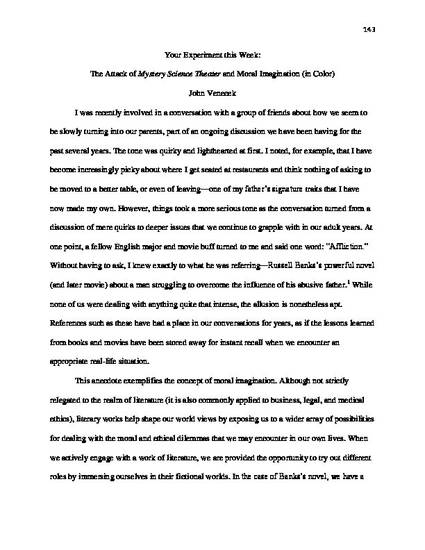
Contribution to Book
The Attack of Mystery Science Theater and Moral Imagination (in Color)
Reading Mystery Science Theater 3000: Critical Approaches
(2013)
Abstract
This chapter applies the philosophical concept of moral imagination to the movies featured on the TV series, Mystery Science Theater 3000. Moral Imagination is often applied to literature that helps expand our moral compass by encouraging us to consider situations we might not encounter in real life. These works play on complex character relations and themes while simultaneously questioning common beliefs and societal norms. The versatility of a well cultivated imagination helps us think outside the realm of societal norms by encouraging us to consider outside perspectives in a compassionate and contemplative manner. Sometimes, however, our rational responses to moral situations can stunt our ability to think creatively about real-life problems by forcing our responses to conform to a specific system of thought. The premise of this chapter is that the types of movies featured on Mystery Science Theater 3000 do us the unintentional favor of shaking up our world views. As failures, they reinvigorate our imaginations and encourage us to ask “weird questions” about situations, which, if they were more effectively executed on screen, we might otherwise take for granted. What we perceive as lazy or uncritical storytelling create spaces for reflection that engages our moral imagination.
Keywords
- Mystery Science Theater 3000,
- Moral Imagination,
- Camp,
- B-Movies
Disciplines
Publication Date
May, 2013
Editor
Shelley Rees
Publisher
Scarecrow Press
ISBN
0810891409
Citation Information
John Venecek. "The Attack of Mystery Science Theater and Moral Imagination (in Color)" 1stLanham MDReading Mystery Science Theater 3000: Critical Approaches (2013) Available at: http://works.bepress.com/john-venecek/2/